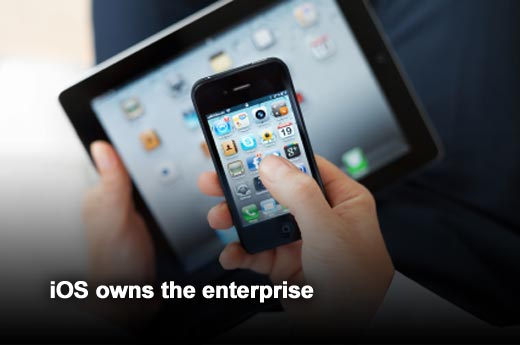As the workplace becomes increasingly more mobile (over 80 million new smartphones and tablets entered enterprises in 2011; that number will reach 140 million by 2013[1]) and the bring your own device (BYOD) trend continues (62 percent of organizations allow employees to use personal devices for work[2]), custom mobile apps are emerging as a way for companies to streamline the way they do business – e.g., engaging customers, driving sales, improving employee productivity, etc.
AppCentral surveyed over 200 people (representing over 100 companies) who use smart mobile devices (i.e., smartphones or tablets) for work. This slideshow features a summary of their key findings.
[1] “Worldwide Quarterly Mobile Phone Tracker,” International Data Corporation (IDC).
[2] “2012 State of Mobile Security,” Michael Finneran, InformationWeek, 3 May 2012.
Click through for key findings from AppCentral’s survey on enterprise mobile app usage.
In order to leverage the ubiquity of smart mobile devices, companies are investing in custom mobile apps in an attempt to change the way they do business. Sixty-eight percent of respondents indicated that their organization had made one or more custom mobile app available to them.
IT is NOT the main funder of mobile projects. Business unit (BU) budgets most often paid for mobile projects, according to 36 percent of respondents. Another 31 percent said that funding comes from marketing and executive leadership budgets.
For the line of business (LOB), higher customer engagement and cost optimization are the primary business drivers for mobility projects. For IT, it’s improving products. However, both agree that revenue generation and increasing employee productivity are important drivers.
In April 2012, it was thought that 10 percent of enterprises had their own stores[1], but AppCentral’s findings show that 19 percent have in-production app stores, a significant change in just a few months.
Fifty-three percent of respondents said that their organization was at some stage of maturity with regard to enterprise app stores. The reason that businesses are investing in enterprise app stores is because of the accompanying enterprise IT controls.
Sixty-four percent of respondents said that they used personal devices for work. Additionally, businesses are investing in enabling mobility for the extended workforce, which represent another form of BYOD. Forty percent of respondents said that non-employees (e.g., business partners, distributors or contractors) are being provided access to in-house custom mobile apps.
Apple’s iOS continues to dominate the enterprise, largely due to Android fragmentation and subsequent management complexity, persistent evidence of new Android malware, and Apple’s iPad being the only truly successful tablet.










